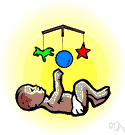neonate
Also found in: Thesaurus, Medical, Legal, Encyclopedia, Wikipedia.
ne·o·nate
(nē′ə-nāt′)n.
A newborn infant, especially one less than four weeks old.
American Heritage® Dictionary of the English Language, Fifth Edition. Copyright © 2016 by Houghton Mifflin Harcourt Publishing Company. Published by Houghton Mifflin Harcourt Publishing Company. All rights reserved.
neonate
(ˈniːəʊˌneɪt)n
(Medicine) a newborn child, esp in the first week of life and up to four weeks old
Collins English Dictionary – Complete and Unabridged, 12th Edition 2014 © HarperCollins Publishers 1991, 1994, 1998, 2000, 2003, 2006, 2007, 2009, 2011, 2014
ne•o•nate
(ˈni əˌneɪt)n.
a newborn child, or one in its first 28 days.
[1930–35; neo- + -nate < Latin nātus born]
ne`o•na′tal, adj.
Random House Kernerman Webster's College Dictionary, © 2010 K Dictionaries Ltd. Copyright 2005, 1997, 1991 by Random House, Inc. All rights reserved.
ThesaurusAntonymsRelated WordsSynonymsLegend:
Switch to new thesaurus
| Noun | 1. |  neonate - a baby from birth to four weeks neonate - a baby from birth to four weeks babe, baby, infant - a very young child (birth to 1 year) who has not yet begun to walk or talk; "the baby began to cry again"; "she held the baby in her arms"; "it sounds simple, but when you have your own baby it is all so different" liveborn infant - infant who shows signs of life after birth low-birth-weight baby, low-birth-weight infant - an infant born weighing less than 5.5 pounds (2500 grams) regardless of gestational age; "a low-birth-weight infant is at risk for developing lack of oxygen during labor" postmature infant - infant born after 42 weeks of gestation; usually shows signs of placental insufficiency preemie, premature baby, premature infant, premie, preterm baby, preterm infant - an infant that is born prior to 37 weeks of gestation SGA infant, small-for-gestational-age infant - an infant whose size and weight are considerably less than the average for babies of the same age stillborn infant - infant who shows no signs of life after birth term infant - infant born at a gestational age between 37 and 42 completed weeks |
Based on WordNet 3.0, Farlex clipart collection. © 2003-2012 Princeton University, Farlex Inc.
neonate
nounThe American Heritage® Roget's Thesaurus. Copyright © 2013, 2014 by Houghton Mifflin Harcourt Publishing Company. Published by Houghton Mifflin Harcourt Publishing Company. All rights reserved.
Translations
ne·o·nate
n. neonato-a, recién nacido-a, de seis semanas o menos de nacido-a.
English-Spanish Medical Dictionary © Farlex 2012
neonate
n neonato -ta mf, recién nacido -da mfEnglish-Spanish/Spanish-English Medical Dictionary Copyright © 2006 by The McGraw-Hill Companies, Inc. All rights reserved.